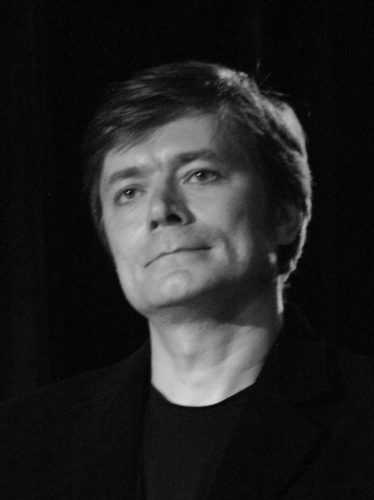


The Principal Director of Chelyabinsk Puppet Theatre, Honored Artist of Russia, winner of the National Theatre Award THE GOLDEN MASK (2012, The Miraculous Journey of Edward the Rabbit), winner of the State Prize of Chelyabinsk Region in the field of culture and arts.
In 1984 Alexander was invited to join Chelyabinsk Puppet Theatre as an actor, where he worked with directors Valery Volkhovsky, Rein Agur, Mikhail Khusid, inheriting from them the liberty in approaching the tradition and the appetite for the experiment. In the 1990s, together with actor Sergei Plotov, Borok created THE BLACK THEATRE, which gained acclaim all over Russia because of its swashbuckling humor and freethinking.
Starting to deal with directing full-time, Borok directed productions in various Russian towns, for several years was the head of Yekaterinburg Puppet Theatre, in 2008 returned to Chelyabinsk where he is working today. His productions received numerous regional theatre awards, became winners at prestigious theatre festivals in Russia. Under his guidance THE STRAW LARK, an international festival of puppet productions for adults, takes place in Chelyabinsk.
Postmodernist games with archetypical images, out-of-ordinary interpretations of classical stories, allowing to look at the original afresh – these are the favorite methods of Alexander Borok, whose productions bring together the author, the character, and the audience in the element of theatrical game.
Name: Borok Alexander Vladimirovich
Date and place of birth: 17 August 1961, Omsk
Education: LGITMiK (a degree in theatre and film acting – major in puppet theatre acting, graduation year – 1984, master teacher Leonid Golovko)
Career: Since 1984 – actor of Chelyabinsk Puppet Theatre. At that time, the Principal Director of that theatre was Valery Volkhovsky, so I went there to work with him. I also worked with Rein Agur (A Midsummer Night’s Dream). When Volkhovsky left, Mikhail Khusid became the Principal Director. When Khusid left, together with Sergei Plotov we created our ‘own’ theatre within that theatre. We named it THE BLACK THEATRE. We started with actors’ parties and continued with directing shows in the theatres of other towns.
1996 – 2002 – Principal Director of Chelyabinsk Puppet Theatre.
2002 – 2005 – Principal Director of Yekaterinburg Puppet Theatre.
2005 – 2008 – freelance artist.
2008 – to the present day – Principal Director of Chelyabinsk Puppet Theatre.
Favorite authors, subjects, stories: Kafka, Kharms, Lewis Carroll, Chekhov, Sasha Cherny, Hoffmann, Shakespeare, Gogol, Brecht, Turgenev, Sorokin, Kozma Prutkov, Limonov, Vvedensky, Prilepin, Pasternak, Pushkin, Hemingway, Ilf and Petrov, Averchenko, Strugatsky brothers, Sheckley, Kuttner, Simak, Mark Twain, Hašek, Čapek, Astrid Lindgren, Volkov, Saltykov-Shchedrin, Andersen, Nosov, Voinovich, Dovlatov, Vampilov, O. Henry, Shukshin, Nabokov, Schwartz, Olesha, Poe, Camus, Vonnegut, Faulkner, Eduard Uspensky, Ulitskaya, Guberman, Lec (there are many).
Favorite traditional system of puppets/texture: I do not have favorite systems of puppets. It all depends on the concept and realization.
Does a performance need text? Whether the text is needed or not depends on the material we are working with. It also depends on the decision as to how this material will be interpreted on stage.
Is the expression “puppet theatre” still relevant today? Any combination of words, associated with theatre and puppets, is relevant.
What, in your opinion, is the difference between puppet theatre in Russia and the West? A large number of repertory theatres. Also, the problems of professional training – people often apply to the department of puppet theatre after failing their entrance examinations at the drama department. I.e., as early as during the training process we already encounter “second rate” students. There are exceptions, but they are quite rare. As a result, we have a huge army of graduates, who start working in the wrong field.
What is useful about collaboration and cultural exchange? Collaboration and cultural exchange are useful, helpful, and necessary by default. Contemporary theatre is impossible without that.